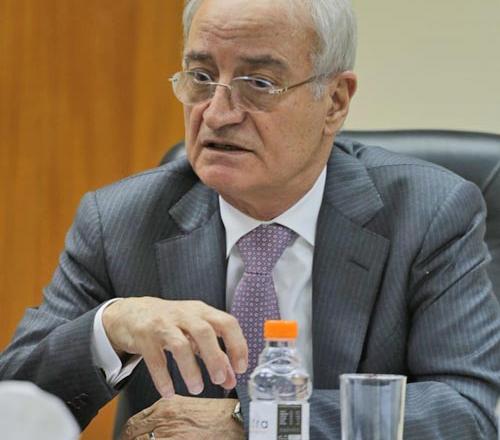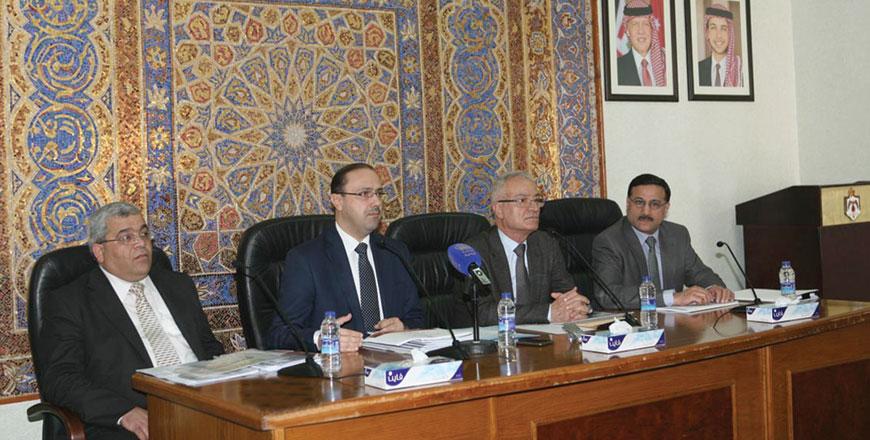AMMAN — Finance Minister Umayya Toukan on Tuesday urged Jordanians to press on with economic activities and not to succumb to a wait-and-see attitude by deferring business plans.
During a dialogue session with journalists, the minister said he wanted to send a message of assurance to the public that the reform path pursued by the government is under control in terms of fiscal discipline and adherence to ceilings.
“The fiscal situation at the end of last year was close to estimates,” he told the media representatives, stressing that the objective was to regain the balance to public finances.
Toukan and other senior officials from the Ministry of Finance attending the meeting defended all policies whether taken in the past or currently in the pipeline and expressed willingness to consider any suggestion that safeguards the Kingdom’s economic and financial interests.
The minister was candid and forthright to expose the troubling difficulties but was quick to indicate that the remedial action taken by the government was beginning to show positive results.
He mentioned energy, Syrian refugees, and the global economic slowdown as the three main headwinds afflicting the Kingdom.
Toukan explained that the economic weakness in the global and regional countries robbed the Jordanian economy from tourism income as well as demand on the Kingdom’s services and products.
He attributed the increase in budget expenditure for this year to higher costs associated mainly with health and education to Syrian refugees.
Thirdly, but most importantly, was the energy sector which the minister described as the “biggest headache” for the Ministry of Finance.
“Entities engaged in energy and power generations have debts on each other,” Toukan said, indicating that the Ministry of Finance is gradually settling JD1.2 billion of losses annually.
“A large portion of the 2013 financing plan related to the energy sector,” he added, noting that the budget deficit will remain high until electricity tariffs come to par with costs.
According to Mohammed Hazaimeh, director of the budget department at the ministry, Parliament panels examined the 2014 budget for more than a month for possible cuts in expenditure but could not find any.
Commenting on the notion that there is hardly any chance of reduction in expenditures, Toukan said the government will continue to improve spending management to give more effectiveness to it.
The 2014 budget was higher by JD670 million but nearly half of the amount was for interest payments to service the Kingdom’s debt, he explained. The remaining amount was for accommodating salaries associated with military and civil service personnel as well as wages to employees engaged with assistance to Syrian refugees.
He said during the meeting that some ministries were under intense pressure to curb expenses to the extent that they postponed paying electricity, water and fuel bills until this year.
“Government ministries requested JD14 billion for operational spending but we cut the amount to JD8 billion,” he indicated to show how much tough the Ministry of Finance is getting in tightening the state Treasury.
Iyad Qudah, director general of the Income and Sales Tax Department, spoke about various issues related to revenue especially regarding the draft tax law currently being debated.
Qudah pointed out that under the amendments to the tax law, the Treasury’s proceeds will rise by JD140 million annually.
Omar Zu’bi, secretary general of the Ministry of Finance, stressed the success achieved through lowering the borrowing costs, pointing out that the Ministry of Finance was able to save about JD70 million by tapping low-cost funds .
“For the first time, Jordan obtained funds from abroad on a large scale to benefit from lower interest rates which ranged between 2.5 and 4 per cent backed by US guarantees compared to between 7.5 and 8 per cent if the lending had come from local sources,” he explained.
The secretary general underlined the government’s shift towards long-term Treasury bonds instead of Treasury short bills in order to possess flexibility in carrying out economic and financial reforms.
Zu’bi also emphasised that the government was keen not to squeeze out the Jordanian private sector from local financing and to provide ample room for banks here to participate in advancing the Kingdom’s development and growth.
He said the high indebtedness was inescapable but the amounts borrowed was much needed to finance the “hidden subsidy”.
According to the secretary general, 60 per cent of the debt is directed to the energy sector and the percentage becomes 70 per cent when the water sector is taken into account.
Zu’bi expected the government to save JD400 million of the energy bill at the end of next year once the imports of liquefied natural gas (LNG) start flowing and adjusted electricity tariffs take effect.
He predicted that all burdens will ease when renewable energy projects start operating later this year, predicting a comfortable financial situation in 2015.
The minister warned against judging certain government decisions without taking into account several elements that come into play and not only one.
“Maintaining stability with steady legislation is paramount to development and growth,” the minister emphasised. “Just as significant is to minimise the risk premium in terms of interest rates, inflation and exchange rates.”
Toukan stressed the importance of continuing dialogue with journalists as such an approach will undoubtedly assure Jordanians about the Kingdom’s positive economic and financial drive.



















